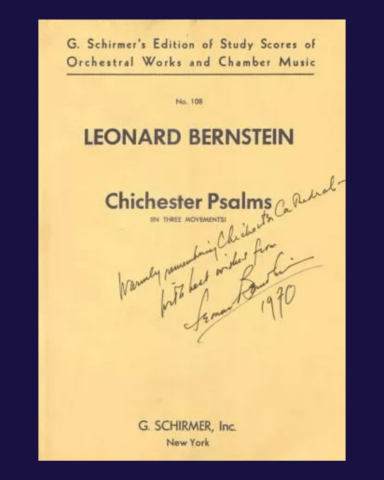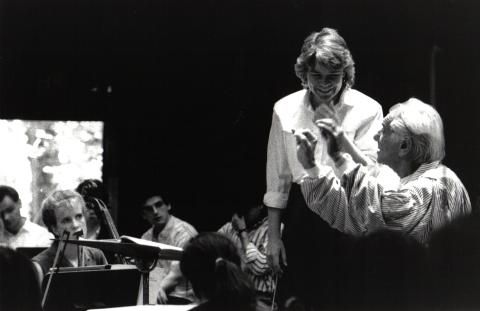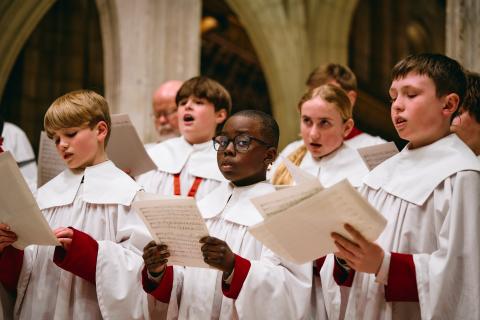Sixty years ago, Chichester Cathedral choristers performed Leonard Bernstein’s Chichester Psalms in front of the maestro himself. Ahead of this year’s anniversary concert, we hear from three who were there.
This year not only marks the 950th anniversary of Chichester Cathedral but also 60 years since the debut of Leonard Bernstein’s well-known masterpiece, Chichester Psalms.
Commissioned by then Dean of Chichester, Walter Hussey, for the Southern Cathedrals Festival in 1965. Chichester Psalms is one of Leonard Bernstein’s most celebrated choral works and has since been performed across the world, furthering the Cathedral’s impressive international reputation for choral music and placing the city of Chichester on the global map.
The male chorus version of Chichester Psalms was premiered with Bernstein in attendance at Chichester Cathedral on 31st July 1965 by the Chichester, Salisbury and Winchester Cathedral Choirs. In honour of this significant anniversary, Chichester Cathedral Choir will be performing the work at a special anniversary concert on Saturday 17th May.
Below we speak to Paul James, Tim Nott and Noel Osbourne, some of the Chichester Cathedral choristers who sang in this monumental performance 60 years ago, when they were 12, 12 and 24 respectively.
Tell us about your experience of premiering Chichester Psalms, a piece that has since been performed the world over. How does it feel to be involved in the legacy of such an enduring work?
Paul: At the time we had no idea that the Chichester Psalms would have such a future and run in the way that it has. I am very proud of having been directly involved and to have been a singer at the premiere performance. The subject often comes up in myriad contexts and people are always intrigued to know about it from me first hand.
Tim: I remember the urgency of learning and perfecting the piece - due to the fact that the individual scores were late arriving to us at the Cathedral. The choir master, Dr John Birch, managed to obtain a copy of the first LP recording of the piece, sung by the Camerata Singers conducted by Leonard Bernstein, accompanied by the New York Philharmonic Orchestra. This helped us to get a feel for the piece.
I feel a sense of achievement and pride that the combined choirs of Chichester, Winchester and Salisbury delivered a performance of Chichester Psalms that was appreciated by the audience and applauded by the composer, who witnessed the performance from the front row.
Noel: We had great expectations of Chichester Psalms. Leonard Bernstein was already a superstar following the global success of West Side Story. We were not disappointed; it became the most successful commission ever by the Southern Cathedrals Festival. The performance itself was enthusiastically received, and the work had immediate impact in the musical world.
Chichester Psalms is sung entirely in Hebrew. How did you find working in such a complex language? Were there any other challenges you encountered when learning the piece?
Paul: Yes, it was a tremendous challenge. Not least because the text in our Roneod scores was handwritten and difficult to read, let alone pronounce. No-one, not even John Birch or Richard Seal, were any the wiser regarding pronunciation. It was exciting and many of the rhythms I’d never encountered - I had not ever sung and counted 2+3 over 4 in a bar!
Tim: Chichester Cathedral Choir had an extremely good reputation, in an article for The Daily Telegraph, journalist Seán Day-Lewis commented; ‘Probably only Westminster Abbey and Chichester Cathedral are at present in the same class as Kings and St Johns at Cambridge and Magdalen and New College at Oxford’. We were a very professional unit under the tutelage of Dr John Birch and Dr Richard Seal. Therefore, we accepted the challenge of singing the piece in Hebrew in the same way that we learned other pieces in Latin or Old English.
Noel: That the Psalms were to be sung in Hebrew came as a late shock, though we should have realised that Bernstein would select texts in Hebrew rather than from the Anglican Psalter. The music itself was not particularly challenging, except perhaps rhythmically.

Do you have a favourite movement from Chichester Psalms? What is it that particularly resonates?
Paul: My favourite part is probably the middle of the second movement, where the gently lilting pianissimo upper voices Adonai is suddenly interrupted by the tenors and basses Allegro Feroce staccato La! Mah! I remember that moment at the very first rehearsal read-through in Song School brought everyone to an abrupt halt wondering what on earth was going on – especially the men’s voices!
I was honoured to be asked to sing the final solo treble verse with the most incredible high-floating phrase up to an A flat, then settling on a long-held pianissimo G natural. Nervewracking!
At the performance day rehearsal, I recall that most of the (Philomusica of London) orchestral musicians couldn’t believe what they were expected to play more-or-less at sight.
Tim: I like the piece in its entirety. The three movements are totally different, and the overall result is wonderfully balanced. For us choristers, it was a most unusual piece to learn and perform, we hadn’t been exposed to the kinds of different rhythms and syncopation that are found in this piece.
Noel: My favourite movement is the second one, with Psalm 23 sung by the boy soloist. On the day it was sung by David Gibson. I have subsequently conducted two performances of Chichester Psalms in the Cathedral: in the first, the solo was taken by David James, former Chichester chorister and member of the Hilliard Ensemble; and in the second we engaged the BBC Chorister of the Year.

What was your impression of Bernstein? Do you have any interesting memories from that time?
Paul: I had not seen a picture of him before the day, nor knew anything about him, except that he was from New York, but it was obvious to me straightaway that this extremely ‘cool’ (in later parlance) exotic person with a long black leather coat draped around his shoulders just had to be Bernstein. Alas, my mother, wasn’t so fast on the uptake. She was taking tea in the marquee during the afternoon and Bernstein had come and sat down beside her at the table. She chatted freely to this “charming American chap” and it was only when someone had the courage to come over and ask for his autograph that the penny dropped for her.
Tim: We were told that Leonard Bernstein would be attending the concert in person, but we were not given any instructions regarding to his presence in and around the Cathedral. We were certainly aware of the fact that he had a formidable reputation, however this did not deter me and a fellow chorister, Howard Davies, from approaching the great man, sat alone at a table in the marquee. He happily signed our festival programmes and talked to us about learning the piece, especially pronouncing the Hebrew verses. We told him that we had been given ‘crib sheets’ to help us. He was very gracious and generous with his time. After the concert he came to the Song School and spoke to members of the choirs. He was very appreciative of our performance and clearly emotionally affected.
Noel: Bernstein was conspicuous in the audience, not least for his very smart clothes. He came into the Song School after the concert and congratulated everyone - in particular soloist David Gibson. He was obviously pleased with what he heard.
At the time, did you and your fellow choristers realise you were taking part in something so significant?
Paul: No, difficult and unusual certainly, but in no way could we have guessed that it would turn out to be such a milestone international choral masterpiece.
Tim: I think that the foremost emotion that I felt was one of excitement, but we were a very professional unit and accepted all that was put before us. For me, the significance of the piece became clearer in later life. However, the fact that I have total recall of that special weekend sixty years on speaks for itself!

What advice would you give younger generations of choristers about singing such a significant work?
Paul: Enjoy every opportunity that presents itself to you, especially if you are a boy treble, with the vocal clock ticking. Who knows, you might just be playing a part in another masterpiece.
Noel: It is a privilege for all choristers to sing in the premiere of a new work. Mostly you do not know whether you will sing it again, so it is wise to approach every piece with enthusiasm and dedication and give it your best shot.
- To witness Chichester Psalms performed by the Chichester Cathedral Choir at the ‘Together in Unity’ concert on Saturday 17th May, click here to book your tickets.
- This year we have an incredible £950,000 in match-funding available for donations made to music, helping to ensure that our choral foundation continues to thrive for generations to come. If you would like to find out more or make a donation, please click here.